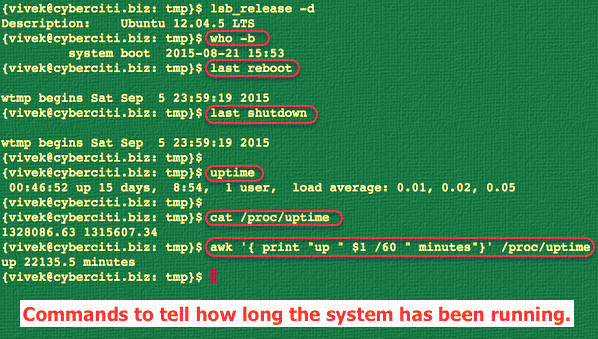mirror of
https://github.com/LCTT/TranslateProject.git
synced 2025-02-28 01:01:09 +08:00
154 lines
5.3 KiB
Markdown
154 lines
5.3 KiB
Markdown
使用 tuptime 工具查看 Linux 服务器系统的开机时间的历史和统计
|
||
================================================================================
|
||
|
||
你可以使用下面的工具来查看 Linux 或类 Unix 系统运行了多长时间:
|
||
|
||
- uptime : 告诉你服务器运行了多长的时间。
|
||
- lastt : 显示重启和关机时间。
|
||
- tuptime : 报告系统的运行时间历史和运行时间统计,这是指重启之间的运行时间。和 uptime 命令类似,不过输出结果更有意思。
|
||
|
||
### 找出系统上次重启时间和日期 ###
|
||
|
||
你[可以使用下面的命令来获取Linux操作系统的上次重启和关机时间及日期][1](在OSX/类Unix系统上也可以用):
|
||
|
||
### 显示系统重启和关机时间
|
||
who -b
|
||
last reboot
|
||
last shutdown
|
||
### 开机信息
|
||
uptime
|
||
cat /proc/uptime
|
||
awk '{ print "up " $1 /60 " minutes"}' /proc/uptime
|
||
w
|
||
|
||
**样例输出:**
|
||
|
||

|
||
|
||
*图01:用于找出服务器开机时间的多个Linux命令*
|
||
|
||
###跟 tuptime 问打个招呼吧###
|
||
|
||
tuptime 命令行工具可以报告基于 Linux 的系统上的下列信息:
|
||
|
||
1. 系统启动次数统计
|
||
2. 注册首次启动时间(也就是安装时间)
|
||
3. 正常关机和意外关机统计
|
||
4. 平均开机时间和故障停机时间
|
||
5. 当前开机时间
|
||
6. 首次启动以来的开机和故障停机率
|
||
7. 累积系统开机时间、故障停机时间和合计
|
||
8. 报告每次启动、开机时间、关机和故障停机时间
|
||
|
||
#### 安装 ####
|
||
|
||
输入[下面的命令来克隆 git 仓库到 Linux 系统中][2]:
|
||
|
||
$ cd /tmp
|
||
$ git clone https://github.com/rfrail3/tuptime.git
|
||
$ ls
|
||
$ cd tuptime
|
||
$ ls
|
||
|
||
**样例输出:**
|
||
|
||

|
||
|
||
*图02:克隆git仓库*
|
||
|
||
确保你安装了带有 sys,optparse,os,re,string,sqlite3,datetime,disutils 和 locale 模块的 Python v2.7。
|
||
|
||
你可以像下面这样来安装:
|
||
|
||
$ sudo tuptime-install.sh
|
||
|
||
或者,可以手工安装(基于 systemd 或非 systemd ):
|
||
|
||
$ sudo cp /tmp/tuptime/latest/cron.d/tuptime /etc/cron.d/tuptime
|
||
|
||
如果系统是systemd的,拷贝服务文件并启用:
|
||
|
||
$ sudo cp /tmp/tuptime/latest/systemd/tuptime.service /lib/systemd/system/
|
||
$ sudo systemctl enable tuptime.service
|
||
|
||
如果系统不是systemd的,拷贝初始化文件:
|
||
|
||
$ sudo cp /tmp/tuptime/latest/init.d/tuptime.init.d-debian7 /etc/init.d/tuptime
|
||
$ sudo update-rc.d tuptime defaults
|
||
|
||
####运行####
|
||
|
||
只需输入以下命令:
|
||
|
||
$ sudo tuptime
|
||
|
||
**样例输出:**
|
||
|
||

|
||
|
||
*图03:tuptime工作中*
|
||
|
||
在一次更新内核后,我重启了系统,然后再次输入了同样的命令:
|
||
|
||
$ sudo tuptime
|
||
System startups: 2 since 03:52:16 PM 08/21/2015
|
||
System shutdowns: 1 ok - 0 bad
|
||
Average uptime: 7 days, 16 hours, 48 minutes and 3 seconds
|
||
Average downtime: 2 hours, 30 minutes and 5 seconds
|
||
Current uptime: 5 minutes and 28 seconds since 06:23:06 AM 09/06/2015
|
||
Uptime rate: 98.66 %
|
||
Downtime rate: 1.34 %
|
||
System uptime: 15 days, 9 hours, 36 minutes and 7 seconds
|
||
System downtime: 5 hours, 0 minutes and 11 seconds
|
||
System life: 15 days, 14 hours, 36 minutes and 18 seconds
|
||
|
||
你可以像下面这样修改日期和时间格式:
|
||
|
||
$ sudo tuptime -d '%H:%M:%S %m-%d-%Y'
|
||
|
||
**样例输出:**
|
||
|
||
System startups: 1 since 15:52:16 08-21-2015
|
||
System shutdowns: 0 ok - 0 bad
|
||
Average uptime: 15 days, 9 hours, 21 minutes and 19 seconds
|
||
Average downtime: 0 seconds
|
||
Current uptime: 15 days, 9 hours, 21 minutes and 19 seconds since 15:52:16 08-21-2015
|
||
Uptime rate: 100.0 %
|
||
Downtime rate: 0.0 %
|
||
System uptime: 15 days, 9 hours, 21 minutes and 19 seconds
|
||
System downtime: 0 seconds
|
||
System life: 15 days, 9 hours, 21 minutes and 19 seconds
|
||
|
||
计算每次启动、开机时间、关机和故障停机时间:
|
||
|
||
$ sudo tuptime -e
|
||
|
||
**样例输出:**
|
||
|
||
Startup: 1 at 03:52:16 PM 08/21/2015
|
||
Uptime: 15 days, 9 hours, 22 minutes and 33 seconds
|
||
|
||
System startups: 1 since 03:52:16 PM 08/21/2015
|
||
System shutdowns: 0 ok - 0 bad
|
||
Average uptime: 15 days, 9 hours, 22 minutes and 33 seconds
|
||
Average downtime: 0 seconds
|
||
Current uptime: 15 days, 9 hours, 22 minutes and 33 seconds since 03:52:16 PM 08/21/2015
|
||
Uptime rate: 100.0 %
|
||
Downtime rate: 0.0 %
|
||
System uptime: 15 days, 9 hours, 22 minutes and 33 seconds
|
||
System downtime: 0 seconds
|
||
System life: 15 days, 9 hours, 22 minutes and 33 seconds
|
||
|
||
--------------------------------------------------------------------------------
|
||
|
||
via: http://www.cyberciti.biz/hardware/howto-see-historical-statistical-uptime-on-linux-server/
|
||
|
||
作者:Vivek Gite
|
||
译者:[GOLinux](https://github.com/GOLinux)
|
||
校对:[wxy](https://github.com/wxy)
|
||
|
||
本文由 [LCTT](https://github.com/LCTT/TranslateProject) 原创编译,[Linux中国](https://linux.cn/) 荣誉推出
|
||
|
||
[1]:http://www.cyberciti.biz/hardware/howto-see-historical-statistical-uptime-on-linux-server/
|
||
[2]:http://www.cyberciti.biz/faq/debian-ubunut-linux-download-a-git-repository/
|